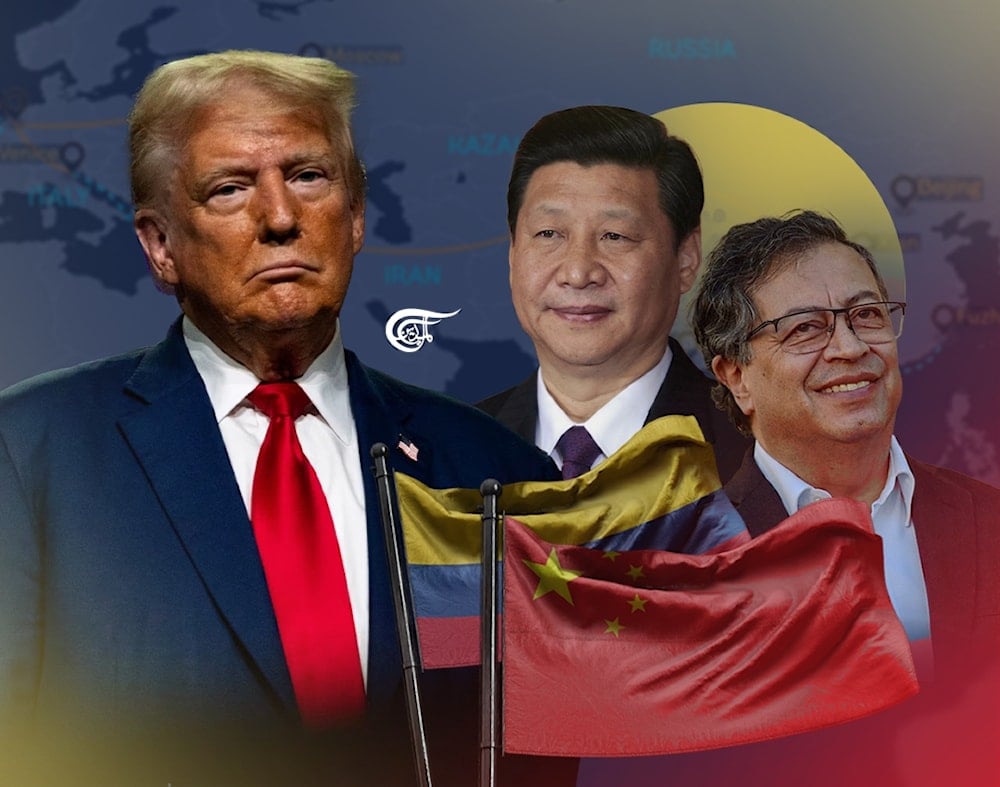Colombia's Silk Road turn: Breaking the chains of US hegemony
Beijing’s status as the region’s top trading partner and a critical source of foreign direct investment (FDI) lends further credibility to its BRI ingress and continued expansion.
-

US hegemony should brace for more critical tests as the region rises up to its foreign policy deficiencies (Illustrated by Zeinab al-Hajj; Al Mayadeen English)
Colombia’s proximity to Washington over the years appears to have taken a hit as the South American state pivoted toward China this month, formally joining the flagship Belt and Road Initiative (BRI). Its inclusion in the China mega-development project is likely to raise nerves in Washington: the Trump administration has made no secret of dialing down the so-called “Chinese influence” in the region and builds on a history of US interventions and coups to score the containment logic home. The fact is that the US, touting supremacy in terms of its infrastructure and connectivity offerings, struggles to live up to the emerging aspirations of Colombia and other South American states.
What binds them together is their pursuit of wide-ranging autonomy and lasting connectivity, an idea that no amount of US geopolitical containment has been able to deliver. Here is why Colombia’s BRI entry marks a major blow to the Trump administration’s geopolitical containment plots in Latin America.
“The PRC [People’s Republic of China] messages its investments as peaceful, but in fact, many serve as points of future multi-domain access for the PLA and strategic naval choke points,” alleged Army General Laura Richardson, the former commander of Southern Command.
First, the logic of preventing South American states from diversifying their economic partnerships doesn’t hold firm. Washington has made no secret of trying to shape the autonomy of countries that wish to exercise economic, connectivity, and trade linkages with China. It also needs to come to terms with the fact that “new opportunities for investment, technological cooperation, and sustainable development” are likely to stem from China-Colombia convergence. Trump, who has viewed Latin America as a security threat and made racist correlations with drug trafficking, organized crime, and migration concerns, is effectively getting a taste of his own medicine by confining US influence to the fringes.
Colombia is not in a pool of one either. Despite possible US interference, a country like Brazil has also succeeded in maintaining a measured approach to the BRI, because the BRI’s traction lies in genuine investment gains and inter-regional trade potential. Trump’s “America First” approach, in contrast, undermines global liberties in trade and finance. That dominating approach, reflective of years of imperialist and colonial tendencies, may struggle to gain an audience in a region that has sent a powerful signal to US influence over the years: enough is enough.
The rise of dedicated forums, such as the China-CELAC Forum, provides more evidence that China keeps advancing its regional outreach through formalized channels. Beijing has continued to advance its engagement with Latin American countries, including Panama, which the US sought to undercut through pressure on the BRI. But the question is, even if the US succeeds in taking Panama out of the BRI, what has the Trump administration offered in defense of its own economic offerings?
What we witness today beats no one: Trump has been pushing for increased tariff pressure on Latin America, on top of the demeaning rhetoric and containment drive that has forced nations in the region to exercise a tough balancing act. While China has pledged a $66 billion yuan credit line to promote the development aspirations of regional states, Trump has advanced a short-term agenda grounded in protectionist policies and a penchant to keep American nationalism front and center of his populist appeal back home. That appeal appears to have found a home in his hawkish foreign policy toward Latin America, emblematic of US resistance to groupings, such as BRICS.
Nerves are likely to be struck further as Colombian President Gustavo Petro frames his country’s entry into the BRI as a “redefinition of Colombia’s global outlook.” That international projection and associated aspirations to serve as an equal with the world could find a powerful match in China, whose diplomacy has gained considerable traction with the Global South. Despite being a developing country, China has continued to promote opportunities for international development through its high-quality opening-up policy and push toward modernization.
These merits arrive despite Washington’s push to undermine the World Trade Organization (WTO) and signal a lasting interest in promoting innovation-driven growth. Beijing’s status as the region’s top trading partner and a critical source of foreign direct investment (FDI) lends further credibility to its BRI ingress and continued expansion. For Trump, who has provoked US-China competition to undercut the autonomy of often developing states, the stakes are clear. Either dial up Washington’s own offerings to match China’s progress on its merits or show long overdue respect for countries such as Colombia, which see BRI as a way to acquire a vantage point on the world stage. "There are no winners in tariff wars or trade wars. Bullying and hegemony will only lead to self-isolation," remarked Chinese President Xi Jinping recently.
“The world today is undergoing accelerated transformations unseen in a century, with multiple risks intertwined and overlapping,” he added.
As such, US hegemony should brace for more critical tests as the region rises up to its foreign policy deficiencies.

 Hannan Hussain
Hannan Hussain
 5 Min Read
5 Min Read











